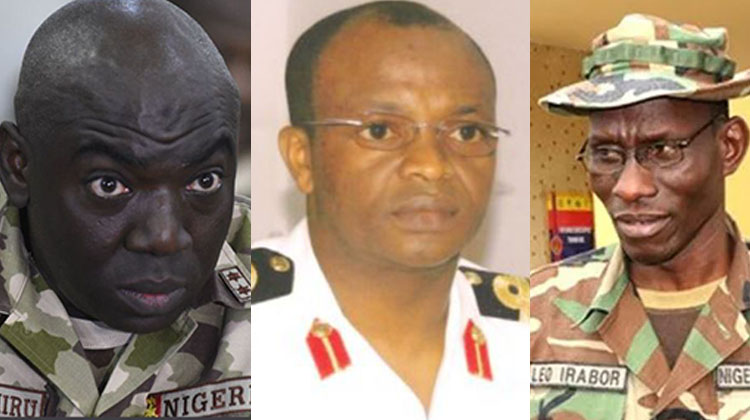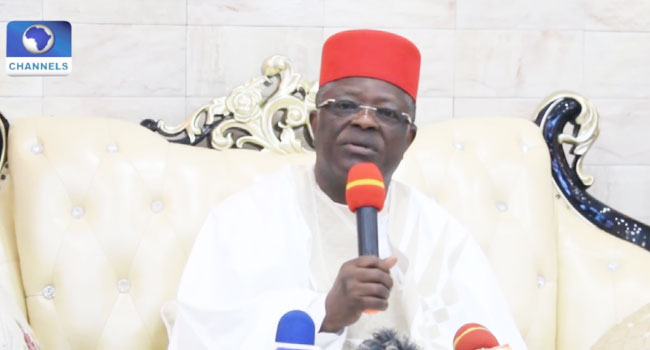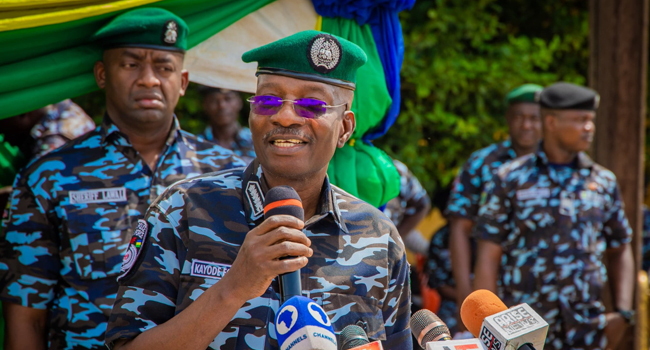By Ibe Pascal Arogorn
Arrogance, ignorance, and incompetence. Not a pretty cocktail of personality traits in the best of situations. No sirree. Not a pretty cocktail in an office-mate and not a pretty cocktail in a head of state. In fact, in a leader, it’s a lethal cocktail. President Muhammadu Buhari had a great chance of ending the prolonged insecurity and terrorism which he inherited from Jonathan’s administration. He missed the opportunity of setting great precedent for himself by uniting the current Nigeria which is heading to a failed divisible state.
But One of the chief features of incompetence was an inability to see it in oneself.
On 13 June 2015, Premium Times reported that President Muhammadu Buhari appointed new Service Chiefs and a National Security Adviser, after sacking their predecessors.
The president appointed Major-General Abayomi Gabriel Olonishakin as Chief of Defence Staff; Major-General T.Y. Buratai as Chief of Army Staff; Rear Admiral Ibok-Ete Ekwe Ibas as Chief of Naval Staff; and Air Vice Marshal Sadique Abubakar as Chief of Air Staff.
He also appointed Air Vice Marshal Monday Riku Morgan as Chief of Defence Intelligence; Retired Major-General Babagana Monguno as National Security Adviser.
After a peak in Boko Haram–related violence in 2014 and 2015, the number of casualties attributed to the group fell dramatically. The Nigerian military—with assistance from Benin, Cameroon, Chad, and Niger—has pushed Boko Haram out of several provinces in northeastern Nigeria, but the group retains control over some villages and pockets of territory and continues to launch deadly suicide attacks and abduct civilians, mostly women and children. In February 2018, more than one hundred students were kidnapped by a faction of Boko Haram known as Islamic State West Africa. They were released a little more than a month later.
The conflict has been primarily contained in the Muslim north, particularly in Borno state, but has displaced millions of people in the region. In June 2018, the Nigerian Army announced that two thousand internally displaced people were to return home. Security forces combatting the militants have also been accused of severe human rights abuses.
Nigeria’s ongoing battle with insurgent groups and continued government corruption threaten the stability and political integrity of Africa’s most populous state. Since 2011, Boko Haram—one of the largest Islamist militant groups in Africa—has conducted terrorist attacks on religious and political groups, local police, and the military, as well as indiscriminately attacking civilians in busy markets and villages. The kidnapping of over two hundred girls from their school in April 2014 drew international attention to the ongoing threat from Boko Haram and the government’s inability to contain it. Following negotiations between Boko Haram and the Nigerian government, brokered by the International Committee for the Red Cross, 103 girls have since been released.
President Muhammadu Buhari, the former military dictator who defeated Goodluck Jonathan, was elected in 2015 on a counterterrorism platform, but economic and political challenges in Nigeria have complicated the fight against Boko Haram. In addition to the military conflict, continuing uneven distribution of oil revenue, high levels of corruption, and violence in the Middle Belt region pose significant challenges to Nigerian security.
In Frederick’s Nwabufo opinion,
In December 2018, Boko Haram insurgents pulled a blitzkrieg on military formations in Baga, Borno state, sacking the headquarters of the multinational joint task force and taking over the place (briefly). The group steadied its onslaughts on military formations, killing many soldiers, weeks after.
At least, 18 soldiers were killed in an ambush on Maiduguri road on December 26, 2018, in one of Boko Haram’s mortal offensives. The group also persisted in inflicting attritive damages on the civilian population in the north-east. The killings and destruction never let up; in fact, they had taken an upward trajectory since the current service chiefs were appointed.
But what did President Muhammadu Buhari say and do in the heat of the killing of soldiers, civilians and attack on military barracks and equipment?
This is what he said in an interview on Arise TV in January, 2019 – a few days after the attacks: “The head [him] has to be very careful on removal of the service chiefs because you don’t know [the] ambition of the ones coming up. I didn’t know them on [a] personal basis, I followed records and thought I picked the best then, of course, their performance may be disappointing but I accept responsibility for not changing them. My reason is based on my own experience.”
Now, compare Buhari’s complacent remarks to the action of President Issoufou Mahamadou of Niger Republic, who sacked his security chiefs after 89 soldiers were killed by terrorists in January, 2020.
My theory is, Buhari is kept the service chiefs, who have failed in their duty, out of self-preservation. He is prioritising loyalty over competence because he still sees the wraith of the 1985 coup in which he was deposed. Boko Haram can sack the entire north-east, but the president will still keep the security chiefs. He considers any threat to his office of far greater concern than any threat to the lives of Nigerians.
Amidst worsen insecurity the had besieged Nigeria, President Muhammadu Buhari on Tuesday finally appointed new service chiefs for the country.
The new service chiefs are Major -General Leo Irabor as Chief of Defence Staff ; Major -General I . Attahiru as Chief of Army Staff ; Rear Admiral A . Z Gambo as Chief of Naval Staff ; and Air -Vice Marshal I . O Amao as Chief of Air Staff .
Among the newly appointed service chiefs, no southeastern personnel was choose to head any of the post in service (Navy, Army or Airforce). Can’t a southeast be recommended or is there anyone that posses qualities of bringing lasting change in the fight against terrorism.
Institutional nepotism might be tolerated in prosperous times. Setbacks can become crises, however, when there is incompetence in key positions at crucial moments. At the root of every form of ungodliness, injustice, nepotism, selfishness, every rivalry and competitive jealousy, is the monster called greed.
In fact, on December 4 2017, The Theatre Commander, Operation Lafiya Dole, Attahiru Ibrahim was removed from that position.
Mr. Ibrahim’s redeployment comes three days after Boko Haram insurgents carried out one of the deadliest attacks on Biu town in Borno where at least 18 people were killed and 52 others seriously injured.
Attahiru ’ s tenure as theatre commander was characterised by several failures and a spike in terrorist attacks .
In May 2017, Attahiru took over the theatre command from Major General Lucky Irabor who is now the Chief of Defence Staff . However , suicide bombings and attacks on military formations increased drastically.
The month after, a group of geologists and technologists from the University of Maiduguri were ambushed by Boko Haram insurgents at Magumeri area of Borno state. About 12 soldiers who escorted the academics were reportedly killed.
Some members of staff of the Nigeria National Petroleum Corporation on the team were also killed in the brutal ambush.
Just imagine, a General who was removed for falling to tackle Bokoharam in 2017 has been promoted to a rank of Chief of Army staff by Buhari. This goes to show how clueless and frustrated Buhari’s administration has extended to.
Really? At the end of the day, nepotism has been there. It’s always going to be there. Don’t expect it to change. But with Nigeria’s uncontrolled insecurity coupled with Buhari’s onesidedness even in the matter of almost concern which involves lives of many Nigerians endangered, Nigeria sits at the keg of a gun powder and will explode soon.
Ibe Pascal Arogorn is a journalist, writer and public affairs analyst
Email: Ibepascal858@gmail.com
Twitter :@Ibepascal6







